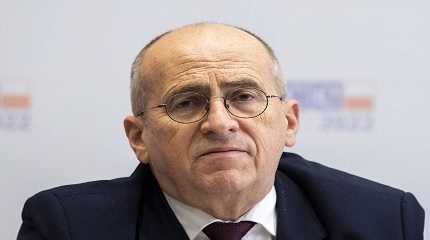
WARSAW, Poland (AP) — Poland’s foreign minister on Monday signed an official note to Germany requesting the payment of some $1.3 trillion in reparations for the damage incurred by occupying Nazi Germans during World War II.
Zbigniew Rau said the note will be handed to Germany’s Foreign Ministry. The signing comes on the eve of Rau’s meeting in Warsaw with Germany Foreign Minister Annalena Baerbock, who is to attend a security conference.
Rau said the note expresses his view that the two sides should take action “without delay” to address the effects of Germany’s 1939-45 occupation in a “lasting and complex, legally binding as well as material way.”
He said that would include German reparations as well as solving the issue of looted artworks, archives and bank deposits. He said Berlin should make efforts to inform German society about the “true” picture of the war and its disastrous effects on Poland.
Warsaw says that payment of reparations would strengthen bilateral relations through truth and justice and would close painful chapters from the past. Germany says the matter was closed decades ago.
Poland’s right-wing government argues that the country that was the war’s first victim has not been fully compensated by neighboring Germany, which is now one of its major partners within the European Union.
On the war’s 83rd anniversary, Sept. 1, Poland’s government presented an extensive report on the damages, estimating it at the $1.3 trillion figure.
Poland’s government rejects a 1953 declaration by the country’s then-communist leaders, under pressure from the Soviet Union, that Poland would not make any further claims on Germany.
Germany argues compensation was paid to Eastern Bloc nations in the years after the war, while territories that Poland lost in the east as borders were redrawn were compensated with some of Germany’s pre-war lands. Berlin calls the matter closed. It was Moscow that decided Poland would receive only a small fraction of the compensation.
In the 1990s Germany paid one-time compensation to former inmates of Nazi concentration camps and to victims of forced labor, including many Poles.
Despite good bilateral relations, Poland’s most powerful politician, Jaroslaw Kaczynski, has recently made increasingly hostile remarks about Germany, recalling its wartime guilt and alleging that it is dominating the European Union.
Critics see that as tactics aimed at rallying backing ahead of general elections scheduled next fall. Opinion polls suggest the ruling Law and Justice party and its allies will lose the narrow majority that now allows them to pass legislation without negotiating with other parties.
Senate Speaker Tomasz Grodzki, a member of the opposition, said anti-German rhetoric was shaping up to be the ruling party’s mantra for the upcoming election — that voting against the ruling part was voting against Poland’s interests.
“This is evident nonsense; it’s untrue. It’s a desperate attempt at defense against surveys that show falling support,” Grodzki said.
Some 6 million of Poland’s citizens, including 3 million Jews, were killed in the war. Some of them were victims of the Soviet Red Army that invaded from the east.




